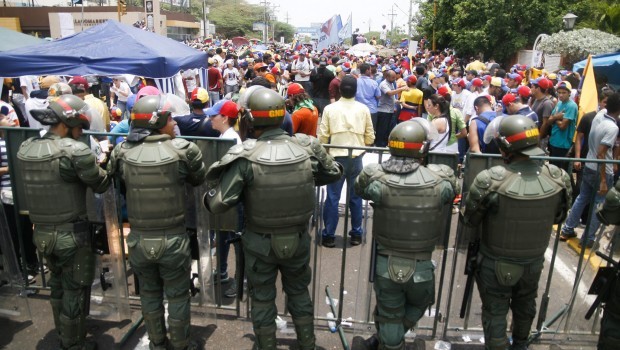
Supporters of Venezuelan leader of opposition Henrique Capriles protest outside the National Electoral Council of Venezuela headquarters in Maracaibo, Venezuela, 16 April 2013. Source: EPA/Humberto Matheus
Caracas, Reuters—Venezuela’s opposition leaders feared persecution over post-election protests, while the US government backed their calls for a recount and said on Wednesday it was still deciding if it would recognize President-elect Nicolas Maduro.
The razor-thin victory by Maduro in Sunday’s presidential vote has been rejected by his rival, Henrique Capriles, who is alleging thousands of irregularities at polling centers and wants a full audit of the ballots.
Seven people have died in opposition-led protests, and the government has vowed legal action against Capriles and others whom they accuse of stirring violence against its backers.
Washington said it had not decided whether to recognize Maduro, a former bus driver-turned-foreign minister who was picked as successor by the late socialist leader Hugo Chavez.
“We think there ought to be a recount,” Secretary of State John Kerry told US lawmakers. “Obviously, if there are huge irregularities, we are going to have serious questions about the viability of that government … I’m not sure that’s over yet.”
There was no immediate response from Maduro’s administration, but on Tuesday a senior ‘Chavista’ official, Diosdado Cabello, had cautioned the United States to “hold its tongue” and not meddle in Venezuelan affairs.
During Chavez’s 14-year tenure, Venezuela was the US government’s main irritant in Latin America and the former soldier frequently invoked “imperialist” plots against him.
Maduro has taken a similarly hard line in public, despite some hopes in both countries for a rapprochement.
The latest instability in the OPEC nation with the world’s largest oil reserves has sent Venezuelan bond prices tumbling.
The unrest, just weeks after Chavez’s death from cancer, has laid bare the deep polarization of a country split down the middle between pro- and anti-government factions, and left its 29 million people on edge.
Capriles has accused the government of ordering gangs to attack his supporters and even his official residence in Miranda state, where he is the governor.
“Anything that happens to me in the official residence at Los Teques is the responsibility of Nicolas Maduro!” he said.
Dozens of government supporters gathered peacefully outside the building on Wednesday, chanting “Capriles is a murderer!” and “Fascist!”, watched by troops.
Though demanding legal action against his opposition rival, Maduro nevertheless said he would be protected.
“I am a man of peace and of my word. I ordered (state intelligence agency) Sebin to maintain protection of the ex-candidate of the right wing,” he said via Twitter.
Another prominent opposition leader, Leopoldo Lopez, said there was a plan to arrest him on charges of destabilization.
Capriles had planned to lead a march on the National Electoral Council headquarters in Caracas on Wednesday, but Maduro banned it. Capriles later called it off, saying the government had plotted to start trouble and then blame him.
“To all my followers … this is a peaceful quarrel. Whoever is involved in violence is not part of this project, is not with me,” the opposition leader said. “It is doing me harm.”
Monday’s scenes of opposition supporters attacking ruling Socialist Party offices, government-run clinics and people celebrating Maduro’s victory were damaging to Capriles’ cause, which he casts as one of democracy versus autocracy.
Evoking the emotive memory of a 2002 putsch against Chavez, which lasted only 48 hours but led to a radicalization of the government and a discrediting of Venezuela’s opposition, Maduro has accused Capriles’ camp of planning another coup d’etat.
About 135 people were arrested and more than 60 hurt during Monday’s clashes, officials said, including one woman whom a mob tried to burn alive. Tuesday’s protests were much quieter, with thousands of Capriles’ followers holding peaceful rallies outside Electoral Council (CNE) offices around the country.
The most successful and charismatic leader the opposition has had since Chavez took office in 1999, the 40-year-old Capriles says the government is responsible for the violence because it denied reasonable requests for a full recount.
Maduro won with 50.8 percent of the vote against Capriles’ 49.0 percent, according to the electoral authority. He is due to be formally sworn in on Friday.
Maduro campaigned on a promise to continue his late boss’s hardline socialist policies. He had a big lead in polls but that evaporated in the final days and the result was much closer than his team had expected.
Capriles says he is sure he won and that his team has evidence of 3,200 irregularities, from voters using fake IDs to intimidation of volunteers at polling centers. Opposition sources say their count showed Capriles had an extra 300,000 to 400,000 votes not shown in the official tally.
The CNE has refused to hold a recount, saying an audit of ballots from 54 percent of the polling centers, in a widely respected electronic voting system, had already been done.
Maduro initially said he was open to a recount but has changed his position. He has called on his supporters to demonstrate all week, culminating in a big rally in Caracas on Friday to coincide with his inauguration ceremony.
Maduro’s narrow victory has raised doubts about whether the disparate alliance that formed around Chavez can hold together without him. The opposition is also a wide-ranging coalition of parties from right to left on the political spectrum.
Maduro jumped on Capriles’ cancellation of Wednesday’s march, saying his rival had started to backpedal.
“No matter how much they retreat, they’ll have to face justice sooner rather than later,” Maduro said, blaming Capriles directly for the bloodshed. “Don’t disguise yourself as a pacifist. You were the one who sent the people to the streets.”
